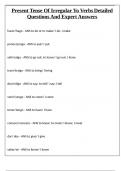Irregular verbs - Study guides, Revision notes & Summaries
Looking for the best study guides, study notes and summaries about Irregular verbs? On this page you'll find 314 study documents about Irregular verbs.
Page 4 out of 314 results
Sort by

-
ESL Praxis Comprehensive Study Set for 5361/5362
- Exam (elaborations) • 376 pages • 2023
- Available in package deal
-
- £12.03
- + learn more
ESL Praxis Comprehensive Study Guide for 5361/5362 Rated A I'm Nola. I go a new york and philadelfia de las vacation. My familia is happy and I am happy. My hermana is happy and my tio like see my familia. Q1. This writing example is characterized by which of the following? (A)Acculturation (B) Code-switching (C) Circumlocution (D) Ethnocentrism (B) Code-switching The three most important people in my life are my mom, my dad, and my sister. My mom is important to me because she always und...
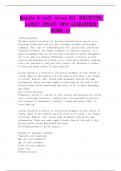
-
Module 6 tefl notes ALL SOLUTUION LATEST UPDATE 2024 GUARANTEED GRADE A+
- Exam (elaborations) • 46 pages • 2024
-
- £11.10
- + learn more
lesson planning The most natural strategy for dealing with different levels is to encourage group work and also pair stronger students with weaker students. This type of differentiation will allow both, gifted and talented children, and weaker students to flourish together. It's good to remember that we all develop at different speeds throughout our lives and it's natural fPlanning a lesson is crucial to your success and planning will allow you to relax more and more, showing your true person...
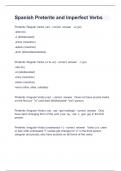
-
Spanish Preterite and Imperfect Verbs Question and answers rated A+ 2024
- Exam (elaborations) • 3 pages • 2024
- Available in package deal
-
- £10.87
- + learn more
Spanish Preterite and Imperfect Verbs Question and answers rated A+ 2024Preterite: Regular Verbs (-ar) - correct answer -é (yo) -aste (tú) -ó (él/ella/usted) -amos (nosotros) -asteis (vosotros) -aron (ellos/ellas/ustedes) Preterite: Regular Verbs (-ir & -er) - correct answer -í (yo) -iste (tú) -ió (él/ella/usted) -imos (nosotros) -isteis (vosotros) -ieron (ellos, ellas, ustedes) Preterite: Irregular Verbs (ver) - correct answer Does not have accent marks on the f...
Present Tense Of Irregular Yo Verbs Detailed Questions And Expert Answers
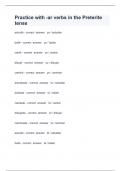
-
PACKAGE DEAL PRETERITE QUESTION AND ANSWERS ALREADY PASSED 2024
- Package deal • 25 items • 2024
-
- £35.34
- + learn more
Irregular Preterite Verbs Questions with complete solution 2024 Exam (elaborations) Practice with Question and answers already passed 2024 Exam (elaborations) Preterite Hacer Question and answers correctly solved 2024 Exam (elaborations) Preterite stem Question and answer 2024 verified to pass Exam (elaborations) Preterite Tense Conjugation
![PECT PreK-4 All Module: Exam Review Questions and answers, rated A+[LATEST EXAM UPDATES]](/docpics/5378796/664bb7c40c188_5378796_121_171.jpeg)
-
PECT PreK-4 All Module: Exam Review Questions and answers, rated A+[LATEST EXAM UPDATES]
- Exam (elaborations) • 14 pages • 2024
- Available in package deal
-
- £6.60
- + learn more
PECT PreK-4 All Module: Exam Review Questions and answers, rated A+ Sensorimotor stage of development (Piaget) - - Age: 0-18 months - infant explores through direct sensory and motor activity. Things learned are based on experience, trial and error. Object permanence and separation anxiety form. Preoperational stage of development (Piaget) - - Age: 2-7 y/o - development of language, memory, imagination. Intelligence is egocentric (focused on self) and intuitive (unable to understand pe...
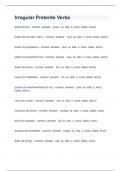
-
Irregular Preterite Verbs Questions with complete solution 2024
- Exam (elaborations) • 1 pages • 2024
-
- £11.26
- + learn more
Irregular Preterite Verbs Questions with complete solution 2024estar (to be) - correct answer estuv- (e, iste, o, imos, isteis, ieron) poder (to be abel "can") - correct answer pud- (e, iste, o, imos, isteis, ieron) poner (to put/place) - correct answer pus- (e, iste, o, imos, isteis, ieron) saber (to know/find out) - correct answer sup- (e, iste, o, imos, isteis, ieron) tener (to have) - correct answer tuv- (e, iste, o, imos, isteis, ieron) hacer (to make/do) - c...
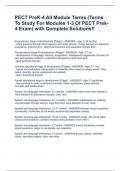
-
PECT PreK-4 All Module Terms (Terms To Study For Modules 1-3 Of PECT Prek-4 Exam) with Complete Solutions!!
- Exam (elaborations) • 7 pages • 2024
- Available in package deal
-
- £8.54
- + learn more
Sensorimotor stage of development (Piaget) - ANSWER-- Age: 0-18 months - infant explores through direct sensory and motor activity. Things learned are based on experience, trial and error. Object permanence and separation anxiety form. Preoperational stage of development (Piaget) - ANSWER-- Age: 2-7 y/o - development of language, memory, imagination. Intelligence is egocentric (focused on self) and intuitive (unable to understand perspective other than self) - goal: symbolic thought con...
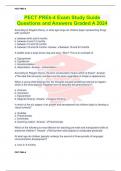
-
PECT PREk-4 Exam Study Guide Questions and Answers Graded A 2024
- Exam (elaborations) • 11 pages • 2024
-
- £10.09
- + learn more
According to Piaget's theory, in what age range do children begin representing things with symbols? a. between birth and 6 months b. between 6 and 12 months c. between 12 and 18 months d. between 18 and 24 months -Answer- between 18 and 24 months A toddler sees a large brown dog and says, "Moo!" This is an example of: a. Egocentrism b. Equilibrium c. Accommodation d. Assimilation -Answer- Assimilation According to Piaget's theory, the term conservation means which of these?...
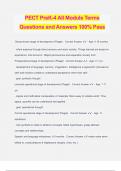
-
PECT PreK-4 All Module Terms Questions and Answers 100% Pass
- Exam (elaborations) • 10 pages • 2024
-
- £9.70
- + learn more
PECT PreK-4 All Module Terms Questions and Answers 100% Pass Sensorimotor stage of development (Piaget) - Correct Answer ️️ -- Age: 0-18 months - infant explores through direct sensory and motor activity. Things learned are based on experience, trial and error. Object permanence and separation anxiety form. Preoperational stage of development (Piaget) - Correct Answer ️️ -- Age: 2-7 y/o - development of language, memory, imagination. Intelligence is egocentric (focused on self) an...

Study stress? For sellers on Stuvia, these are actually golden times. KA-CHING! Earn from your revision notes too and start uploading now. Discover all about earning on Stuvia

